A ban on the dog meat industry will come into effect until 2027. Meanwhile, call for a dog meat-free Bok Nal.
Humane Society International / South Korea
Humane Society International / South Korea
A ban on the dog meat industry will come into effect until 2027. Meanwhile, call for a dog meat-free Bok Nal.
Humane Society International / South Korea

SEOUL—More than 20 Korean animal protection groups and hundreds of citizens are expected to gather in Seoul on July 13 to mark the start of South Korea’s first Bok Nal since the National Assembly voted in January to ban the dog meat industry.
Although appetite for dog meat soup (bosintang ) is at an all-time low, its consumption is most popular during Bok Nal, when it is believed by some to help beat the heat. This Bok Nal—which begins on July 15—Humane Society International/Korea is urging citizens to have a dog meat-free Bok Nal and believes the phase out plan and government support offers dog meat farmers an opportunity to leave behind them a dying industry with no financial future and embrace South Korea’s growing plant-based food culture.
A 2021 Statista survey estimates that up to 2.5 million people in South Korea identify as vegan and HSI/Korea believes instead of converting farms to rear other animals such as black goats or pigs, dog farmers should capitalize on consumer interest in eating for human health, animal welfare and the planet.
Since 2015 HSI/Korea’s Models for Change program has worked with 18 dog meat farmers, providing one-off grants to transition them out of the industry to a new life.
HSI/Korea’s dog meat campaign manager, Sangkyung Lee, says: “While some of the elderly dog meat farmers with whom HSI/Korea has worked have chosen to retire, most farmers have transitioned their businesses to humane, sustainable livelihoods such as growing crops, water delivery and other trades. With government support, it should be entirely possible for most dog farmers to switch to humane industries that don’t exploit dogs or any other animals such as black goats or pigs. With more South Koreans than ever before exploring healthier plant-based eating, it would be a smart move for dog farmers to switch to producing the fresh vegetables and herbs that consumers are seeking for meat-free cooking.”
The South Korean market for plant-based foods is booming. The Korea Vegan Union estimates that one-third of the population regularly enjoy vegetarian meals, and surveys show that Korean consumers are increasingly interested in eating more meat-free meals for health and environmental protection reasons. In a Nielsen Korea opinion poll commissioned by HSI/Korea in 2023, 32.1% of respondents believe that no animals should be killed for meat. The Korea Rural Economic Institute forecasts that the domestic plant-based alternative food market size will grow to KRW 280 billion by 2026, and the Korean Tourism Organization has even launched the country’s first ever vegan food tour to capitalize on its vibrant plant-based cuisine.
In addition to the market opportunities of plant-based agriculture, HSI/Korea believes that transitioning to farming other animals such as black goats or pigs would simply replace one work intensive and environmentally polluting animal-based industry with another.
Sangkyung Lee explains: “With improved environmental protection regulations in South Korea, one of the most common complaints local authorities receive about dog farms is the noise and the smell. We know that this has caused major issues for many dog farmers, so why repeat those issues with pigs and goats when you can grab this opportunity for a more peaceful and sustainable arable farming venture that plugs into people’s passion for healthful plant-based foods?”
The Special Act on the Prohibition of Dog Meat Consumption will see the breeding, slaughter and sale of dogs for meat banned by 2027. Dog meat farms, slaughterhouses and restaurants that submit a closure implementation plan by August 5 will qualify for government financial support to close or transition to a new business. By September, the government will publish its Basic Plan to End Dog Meat Consumption which is intended to include practical details of how it intends to phase out the estimated 1,507 dog meat farms, 163 dog slaughterhouses, 2,276 dog meat restaurants and how to address the more than 500,000 dogs who are estimated to be living on dog meat farms.
South Korea now joins a growing list of countries, territories, provinces, cities and regencies across Asia that have banned the dog meat trade (with varying degrees of enforcement), including Hong Kong, Taiwan, the Philippines, India, Thailand and Singapore, as well as the cities of Shenzhen and Zhuhai in mainland China, Siem Reap province in Cambodia, and 45 cities, regencies and provinces in Indonesia. In 2022 HSI expanded its Models for Change program into Viet Nam where 5 million dogs and 1 million cats are trafficked and killed annually for meat; so far six dog or cat meat businesses have closed and transitioned as a result of the program.
ENDS
Media contact: Wendy Higgins, director international media ; whiggins@hsi.org
Notes
This survey was conducted online in August 2023, targeting 1,500 respondents aged 18 to 59, considering gender, age and regional demographics, with margin of error +-2.53%.
Humane Society International / South Korea
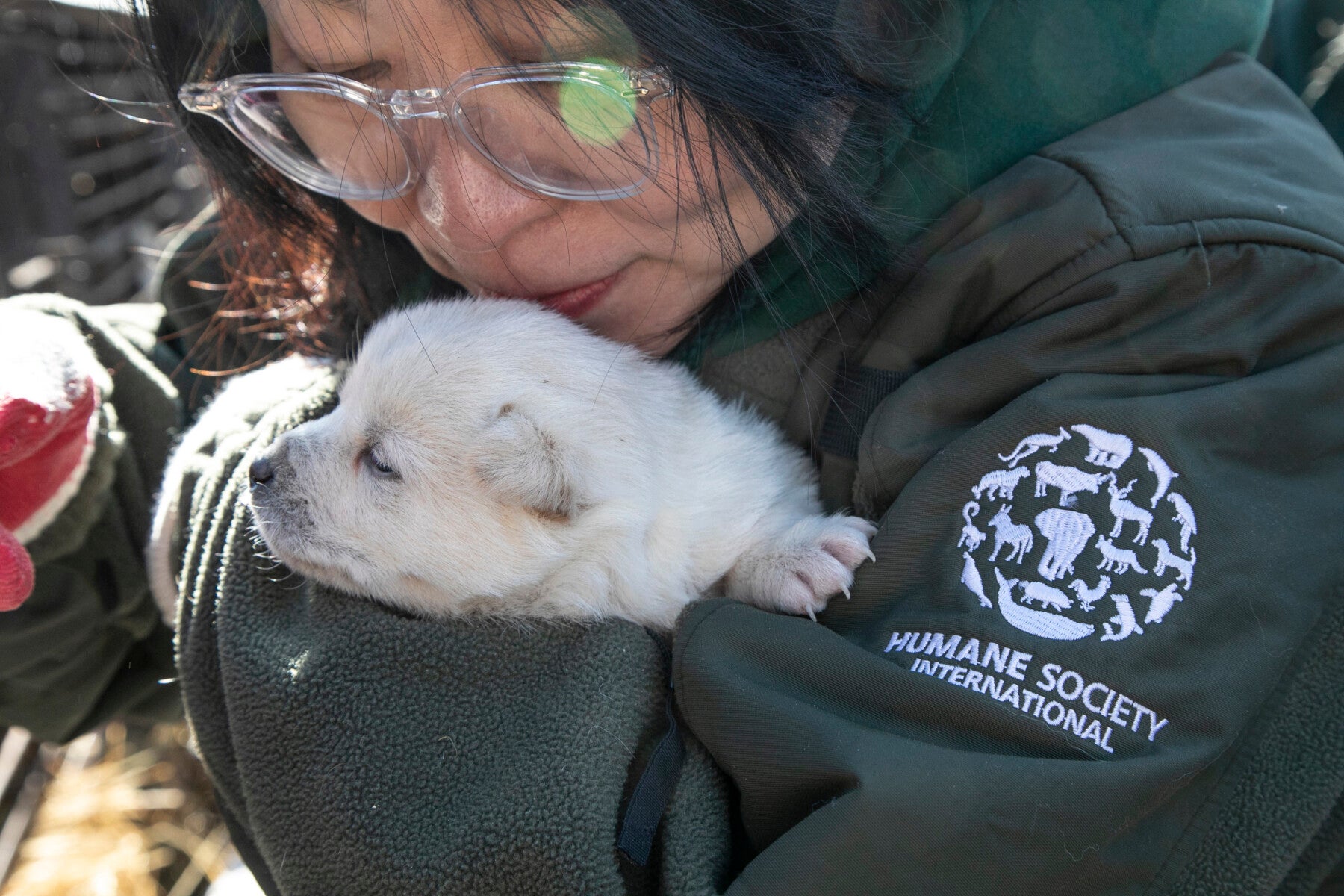
SEOUL—South Korea’s National Assembly has today voted through a ban on the dog meat industry in what animal campaigners at Humane Society International/Korea have called “history in the making.” Up to 1 million dogs a year are factory farmed and killed for human consumption in the country. The ban, which comes into force in six months’ time with a three-year phase out, will make the breeding, slaughter and sale of dogs and dog meat for human consumption illegal from 2027, with penalties of up to three years’ imprisonment or a fine of up to 30 million KRW.*
This news follows considerable public and political momentum. With over 6 million pet dogs now living in Korean homes, demand for dog meat is at an all-time low. A 2023 Nielsen Korea opinion poll shows that 86% of South Koreans won’t eat dog meat in the future and 57% support a ban.
JungAh Chae, executive director of Humane Society International/Korea, which has campaigned tirelessly for a ban, welcomed the news by saying: “This is history in the making. I never thought I would see in my lifetime a ban on the cruel dog meat industry in South Korea but this historic win for animals is testament to the passion and determination of our animal protection movement. We reached a tipping point where most Korean citizens reject eating dogs and want to see this suffering consigned to the history books, and today our policymakers have acted decisively to make that a reality. While my heart breaks for all the millions of dogs for whom this change has come too late, I am overjoyed that South Korea can now close this miserable chapter in our history and embrace a dog-friendly future.”
Dog farmers, slaughterers and restaurant owners will be eligible to apply for compensation, and after review, government support will be offered to transition or close those businesses, similar to the Models for Change program run by HSI/Korea. Since 2015, HSI has helped 18 dog farmers across South Korea switch to growing crops such as chili plants and parsley, or water delivery and other livelihoods.
HSI/Korea urges the government to use the three-year phase out period to work with animal groups including HSI/Korea to rescue as many dogs as possible in a state-sponsored, coordinated effort.
Kitty Block and Jeff Flocken, respectively CEO and president of HSI globally, issued a joint statement, saying: “This is a truly momentous day for our campaign to end the horrors of the dog meat industry in South Korea, and one we have been hoping to see for a very long time. Having been to dog meat farms, we know only too well the suffering and deprivation these desperate animals endure in the name of an industry for whom history has now thankfully called time. This ban signals the end of dog meat farming and sales in South Korea, and we stand ready to contribute our expertise until every cage is empty.”
South Korea now joins a growing list of countries and territories across Asia that have banned the dog meat trade (with varying degrees of enforcement), including Hong Kong, Taiwan, the Philippines, India, Thailand and Singapore, as well as the cities of Shenzhen and Zhuhai in mainland China, Siem Reap province in Cambodia, and 45 cities, regencies and provinces in Indonesia.
Download video and photos of HSI/Korea’s dog meat farm closure program in action here.
ENDS
Media contacts:
Notes: The legislation includes a penalty of up to two years of imprisonment or a fine of up to 20 million KRW for the breeding and sale of dogs for consumption, and up to three years of imprisonment or a fine of up to 30 million KRW for the slaughter of dogs for human consumption.
Humane Society International / South Korea
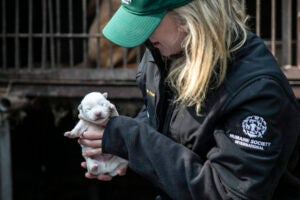
SEOUL—One month after the South Korean government announced a bill to ban the dog meat industry, 27 dogs rescued from a dog meat farm in Asan, Chungcheongnam-do have flown to the United States in search of loving homes. At the time of rescue in March this year by animal charity Humane Society International/Korea, these dogs—including Bumblebee, Parker, Trudy, Bruno and Mia—had not even been born yet when HSI/Korea saved their pregnant mums. Although previously too young to fly overseas, Nana, Nadia, Corbin, Covy Chico and the others are now old enough to make the journey. Mother dogs Raspberry and Zelda will also fly with their grown pups.
All had been fated to be killed for their meat as part of an industry that breeds and slaughters up to 1 million dogs a year for human consumption. They were saved as part of a 200-dog rescue when HSI/Korea worked with the farmer, who wanted to leave dog farming behind him and convert his land into a self-sufficient crop field growing cabbages and other vegetables.
With five legislative bills to ban the dog meat industry, and now the commitment of a government-backed bill, HSI/Korea says these 27 dogs are a reminder to policy makers that campaigners are counting the days for politicians to take action on a ban. The latest opinion surveys by Nielsen Korea in 2023 show that most South Koreans (87.5%) don’t eat dog meat and 56% support a ban.
Sangkyung Lee, HSI/Korea’s End Dog Meat campaign manager, helped rescue the dogs and said: “The dog meat farm where these 28 pups came from was a hellish scene. Some 200 dogs were locked in barren, metal cages in squalid conditions thick with feces, many suffering from malnutrition as well as painful skin and eye diseases. Thankfully, most of these 27 were too young to remember the trauma of those days, and it makes me so happy to know that they will soon be embraced with new names and cherished as loved family members in the United States. It’s one month since the South Korean government pledged to ban the dog meat industry, with each one of these dogs symbolising a day that we have waited for political action. We need to get this ban done so that no more dogs have to suffer for a meat that virtually no-one wants to eat.”
Since 2015, HSI/Korea’s Models for Change program has helped dog farmers in South Korea transition to new, more humane and profitable livelihoods such as chili plant and parsley growing or water truck delivery. HSI/Korea has permanently closed 18 dog meat farms so far and rescued more than 2,700 dogs who have flown to the United States, Canada and the United Kingdom to find homes, with a small number rehomed in South Korea.
After arrival in the United States, the 27 dogs will be settled at the charity’s care and rehabilitation center near Washington, D.C., where they will receive the love and comfort the dog meat industry denied them, including soft beds, nutritious food, toys, veterinary care and rehabilitation. After this initial phase, they will be transferred to shelter and rescue partners where they will be prepared for adoption into loving homes.
HSI’s rescues are conducted in compliance with national and local COVID-19 health and safety protocols. Following removal from farms, dogs were evaluated by a veterinarian. They were vaccinated against rabies, distemper, hepatitis, parvovirus, parainfluenza, leptospira, and canine influenza, and screened for respiratory illness as needed to ensure the health of each animal and comply with international export and import requirements.
Download Images of the Dogs Leaving South Korea at Incheon Airport
Download Images of the Dog Farm Rescue
ENDS
Media contact: Haewon Lee, HSI/Korea media and communications specialist: hlee@hsi.org
Humane Society International
Humane Society International / South Korea

SEOUL—Humane Society International/Korea and 346 South Korean academic and industry experts delivered a letter to the chair of National Assembly’s Health and Welfare Committee, Dong Kun Shin, urging the Korean government to pass bills promoting state-of-the-art science replacing animal testing.
With an increasing consensus among scientists recognizing the importance of providing systemic support in developing and implementing human-based non-animal methods, two bills were introduced at the National Assembly; the Act on the Promotion of Development, Dissemination and Use of Alternatives to Animal Testing Methods (PAAM Act), sponsored by Assembly member In-Soon Nam in 2020, and the Act on the Vitalization of Development, Dissemination, and Use of Alternatives to Animal Testing Methods (VAAM Act), sponsored by Assembly member Jeoung Ae Han in 2022.
Through a series of political forums to discuss these bills with authorities and wider stakeholders in the past few years, a general agreement has been established that South Korea is at a pivotal moment in advancing health and safety science without relying on animal models. To achieve this, the bills stipulate collaborative work between authorities by providing a basic plan every five years. In addition, a committee consisting of experts in alternative approaches to animal testing will be established pursuant to the Act.
One of the signatories of the letter, Professor Kyungmin Lim, at Ehwa University said: “As a researcher, I work closely with new method developers and end-users. I experience time and time again the need to have a legislation in Korea to support those scientists and a relevant network for collective efforts in developing and accepting alternative approaches to animal use.”
HSI/Korea’s director of government affairs, Borami Seo said: “There is an increasing interest in using modern technologies that are more predictive of human responses than animal models. Last May, ’Korea’s innovative strategic industry committee’ selected the cell-based human mimetic method organoid as an ‘innovative strategic technology’ and promised research and development support. We are witnessing an increasing demand for these technologies, and the PAAM Act and VAAM Act are exactly the bills that are crucial to ensure these research and development efforts lead to its regulatory uptake and industrial use in the field. Now is a critical time to pass this legislation.”
ENDS
Media contact: Borami Seo bseo@hsi.org
Humane Society International / South Korea

SEOUL—In an historic announcement, the South Korean government has stated that before the end of this year it will introduce a bill to ban the dog meat industry, which sees up to 1 million dogs a year farmed and killed for human consumption. At a meeting in Seoul today between the Ministry of Agriculture, Food and Rural Affairs, representatives of the ruling Peoples Power Party and Korean animal groups including Humane Society International/Korea, a government bill was confirmed with a three-year phase out period once legislation is passed, meaning the ban would come into effect in 2027.
Compensation will be offered to help legally registered dog meat farmers, traders, slaughterers and restaurant owners transition or close their businesses, similar to the Models for Change program run by HSI/Korea, which has worked with 18 dog farmers across the country since 2015 to switch to growing chili plants or parsley delivering water and other livelihoods.
This news follows considerable public and political momentum for a ban, including the introduction of five legislative bills by National Assembly Members. The news is welcomed by HSI/Korea, one of the leading animal groups campaigning for an end to dog meat nationwide.
JungAh Chae, executive director of Humane Society International/Korea, who attended the meeting with MAFRA, says: “News that the South Korean government is at last poised to ban the dog meat industry is like a dream come true for all of us who have campaigned so hard to end this cruelty. Korean society has reached a tipping point where most people now reject eating dogs and want to see this suffering consigned to the history books. With so many dogs needlessly suffering for a meat that hardly anyone eats, the government’s bill delivers a bold plan that must now urgently be passed by the Assembly so that a legislative ban can be agreed as soon as possible to help South Korea close this miserable chapter in our history and embrace a dog friendly future.”
With growing concern for animal welfare, and over 6 million pet dogs now living in Korean homes, demand for dog meat has dwindled. Latest opinion polls by Nielsen Korea commissioned by HSI/Korea show that 86% of South Koreans won’t eat dog meat in the future and 57% support a ban.
HSI recognizes that a short phase out period is an inevitable consequence of dismantling the trade and helping farmers and traders transition to other livelihoods. However, HSI urges the government to use the phase out period to work with animal welfare groups like HSI/Korea to rescue as many dogs as possible in a state-sponsored, co-ordinated effort.
HSI/Korea’s Models for Change program has rescued more than 2,700 dogs from dog farms across South Korea who have found adoptive homes in the United States, Canada, the United Kingdom and the Netherlands, with a small number rehomed in South Korea. Most of the farmers with whom HSI/Korea has worked experience mounting societal, family and financial pressure to get out of farming dogs.
Kitty Block and Jeff Flocken, respectively CEO and president of HSI globally, issue a joint statement, saying: “This is a momentous day for HSI’s campaign to end the horrors of the dog meat industry in South Korea, and one we have been hoping to see for a very long time. Having been to dog meat farms and seen HSI/Korea’s Models for Change program in action, we know only too well the suffering and deprivation these desperate animals endure in the name of an industry for whom history has now thankfully called time. This is the beginning of the end of dog meat farming in South Korea, and HSI stands ready to contribute our expertise until every cage is empty.”
Dog meat facts:
Download here video and photos of HSI/Korea’s dog meat farm closure program in action
ENDS
Media contact:
Humane Society International / South Korea
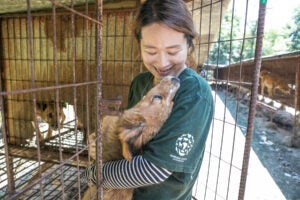
SEOUL―The vast majority of South Koreans (86%) have little to no intention of consuming dog meat in the future, regardless of their past consumption, according to a new survey by Nielsen Korea commissioned by animal group Humane Society International/Korea. A majority (57%) support a ban on the dog meat industry, and around 65% of those polled expect to see an end to dog meat consumption in less than two years. Animal cruelty is the top reason for those supporting a ban (53%) with almost 50% (49.7%) citing unsanitary conditions of dog meat production as the main motivator.
The results of the “2023 Dog Meat Consumption and Attitude Survey” are released amid a surge in political discussions on banning the dog meat industry in South Korea. Four legislative bills for a ban have been proposed, and 44 members of the National Assembly― including Han Jeong-ae of the Democratic Party of Korea and Lee Heon-seung of the People Power Party―have supported a parliamentary resolution to end the dog meat industry. Recently, First Lady Kim Geon-hee once again emphasised her commitment to a ban, joining Korean animal welfare groups including HSI/Korea at a press conference last month.
The most significant attitude shift seen in the Nielsen/HSI survey is observed among people in their 40s and 50s, traditionally considered the primary consumers of dog meat. According to the survey, negative perceptions of dog meat and a heightened empathy for the well-being of all dogs have increased in this age group since last year. For example, 73% of people in their 50s now express the view that all dogs―whether pets or on dog meat farms― should be protected, and 64% in this age category cite animal cruelty as their main reason for supporting a ban on the dog meat industry.
Sangkyung Lee, dog meat campaign manager for HSI/Korea, said: “As politicians from all parties are showing support for a ban on the dog meat industry, our survey clearly shows that they have the backing of the Korean people, the vast majority of whom don’t eat dog meat. The cruelty of the dog meat industry is the top reason cited for supporting a ban, with the unsanitary conditions the second highest motivating factor, both figures that we believe will continue to rise as people become increasingly aware of the animal suffering and lack of hygiene inherent in the dog meat industry. HSI/Korea’s Models for Change program has successfully worked with 18 dog meat farmers so far to permanently close their farms and help them transition to alternative, humane livelihoods. Our work demonstrates that cooperation with dog meat farmers is possible and that an end to this industry can be a win:win for both people and dogs. Legislative efforts by lawmakers and the government are now urgently needed for the passage of a dog meat ban into law.”
Overview of main findings:
Photos and video of HSI/Korea rescuing dogs from a dog meat farm in March 2023
ENDS
This survey was conducted online in August 2023, targeting 1,500 respondents aged 18 to 59, considering gender, age and regional demographics, with margin of error +-2.53%.
Media contact: Wendy Higgins, HSI’s director of international media: whiggins@hsi.org
Humane Society International / South Korea
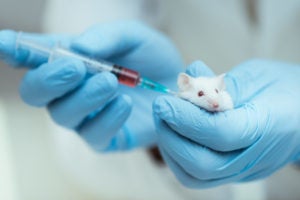
SEOUL—South Korea’s annual statistics on scientific use of animals reveal a record-high 4,995,680 in 2022, continuing an alarming upward trend. This is the highest number of animal use since the Ministry of Agriculture, Food and Rural Affairs started publishing the statistics in 2012.
The animal protection group Humane Society International/Korea condemns the steady increase in animal testing and calls for substantial and immediate action to position human-relevant approaches as the gold standard in Korean regulatory and bio-science testing. Nearly half of animals used in 2022 were subjected to the most severe category of experiment in which they are denied anesthetic or tranquilizing drugs while being exposed to massive doses of chemicals or used for cancer or infectious disease studies that will result in their deaths.
The 2022 statistical information also shows that animals are used most frequently in areas such as regulatory testing, basic research and translational research. For all these areas, there are immediately available alternatives to animal methods or non-animal methodologies that can be applied, such as human cell-based skin testing methods. Despite available approaches without using animals, the number of newly opened animal testing facilities also increased from 2021 to 2022.
HSI/Korea’s director of government affairs, Borami Seo, said: “This report shows that Korean bio-science is stuck in the past, heavily relying on animal testing despite new human mimetic methodologies emerging without animal use. We urge lawmakers to pass legislation that will support science without animal suffering. This will be critical in placing South Korea in the center of the rising global trend to advance human health studies and treatment.”
Globally, studies such as organ-on-a-chip or organoid are receiving increasing attention because they have been shown to sometimes real-world predict human-biology based outcomes more accurately than the results that are obtained from animal models. While there are sporadic funding opportunities by central governments to study these non-animal approaches, HSI/Korea argues that a legislative system is necessary to support not only such research efforts, but also to ensure adaptation by regulatory authorities and use at the industrial level. Currently there are two bills introduced at the National Assembly, the Act on the Promotion of Development, Dissemination, and Use of Alternatives to Animal Testing Methods, sponsored by Assembly member In-soon Nam and the Act on the Vitalization of Development, Dissemination, and Use of Alternatives to Animal Testing Methods, sponsored by Assembly member Jeoung-Ae Han.
Read the Official 2022 Lab Animal Statistics (In Korean)
ENDS
Media Contact: Borami Seo: bseo@hsi.org
Humane Society International / South Korea
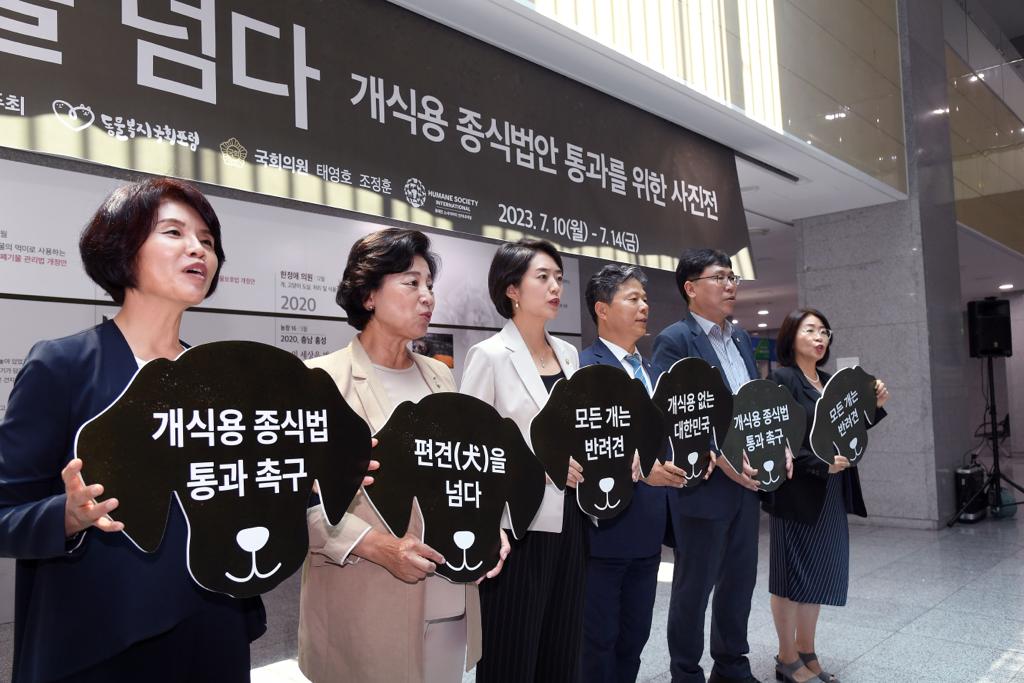
SEOUL—South Korean lawmakers gathered at the country’s National Assembly today for the opening of an exhibition in support of a legislative ban on the dog meat industry, co-hosted by the Animal Welfare Forum, Humane Society International/Korea and National Assembly members Young-ho Tae and Jeong-hoon Jo.
The “Beyond Prejudice: For the Passage of a Dog Meat Ban bill” exhibition opened with presentations from National Assembly members In-soon Nam, Young-seok Suh and Minjeong Ko as well as Seoul Council member, Ji-hyang Kim who recently introduced a Seoul city ordinance amendment bill to ban dog meat in the city, and said at the event, “Dog meat practice has to stop now. Now is the opportunity, supported by cross party politicians.”
HSI/Korea’s director of government affairs, Borami Seo, spoke about the compelling animal welfare and societal case for phasing out the breeding, slaughter and sale of dogs for human consumption. The event took place on the eve of Cho Bok, the first of the three hottest days of the summer according to the lunar calendar when dog meat is most popular.
Democratic Party Assembly member Jeoung-ae Han spoke about the Special Act legislative bill she introduced on June 28, which seeks to prohibit dog meat farms, dog slaughterhouses and the sale of dog meat. Jeoung-ae Han said at the event “I hope to see all cross parties come together to tackle the dog meat problem during this National Assembly session.” National Assembly member In-soon Nam said, “This Special Act seeks to support farmers with alternatives to help close down the farms. With the passage of this bill, dog meat farms can change to humane practices and dogs will be given second chance to meet families.”
The bill also advocates for supporting dog farmers to transition to alternative businesses, similar to HSI/Korea’s Models for Change program which since 2015 has worked co-operatively with dog farmers keen to exit the industry. HSI/Korea has so far permanently closed down 18 dog farms, rescued more than 2,700 dogs for adoption overseas, and helped farmers switch to alternative, humane and more sustainable livelihoods, including crop harvesting, chili plant cultivation and water delivery.
Borami Seo, HSI/Korea director of government affairs, says: “We have reached a tipping point in South Korea where the majority of the general public do not eat dog meat and want to see an end to the dog meat industry. As Koreans we are entering a new relationship with dogs based on friendship and compassion, and in this new relationship the breeding, slaughtering and sale of dogs for human consumption can no longer continue. For almost a decade, HSI/Korea’s Models for Change program has demonstrated that it is possible to work with dog farmers to phase out this cruel industry. Now we look to our legislators to finish the job by introducing a ban to end this unnecessary suffering for good.”
The exhibition is being supported by South Korea’s TV veterinarian Seol Chae Hyun who sent the following comment: “As a veterinarian, I pledged an oath to the welfare of animals, their relief from pain from disease and for the promotion of public health. None of these things are compatible with the dog meat industry. We have a duty to care for our canine companions, and that includes ending their needless suffering on dog meat farms. ”
This exhibition comes at a time of increasing public and political support for ending the dog meat industry in South Korea. First lady Kim Keon-hee has openly called for a ban, and latest opinion surveys by Nielsen Korea commissioned by HSI/Korea show that 87.5% of the population don’t eat dog meat or won’t in the future, and 56% support a legislative ban.
ENDS
Media contact:
Wendy Higgins, director of international media: whiggins@hsi.org